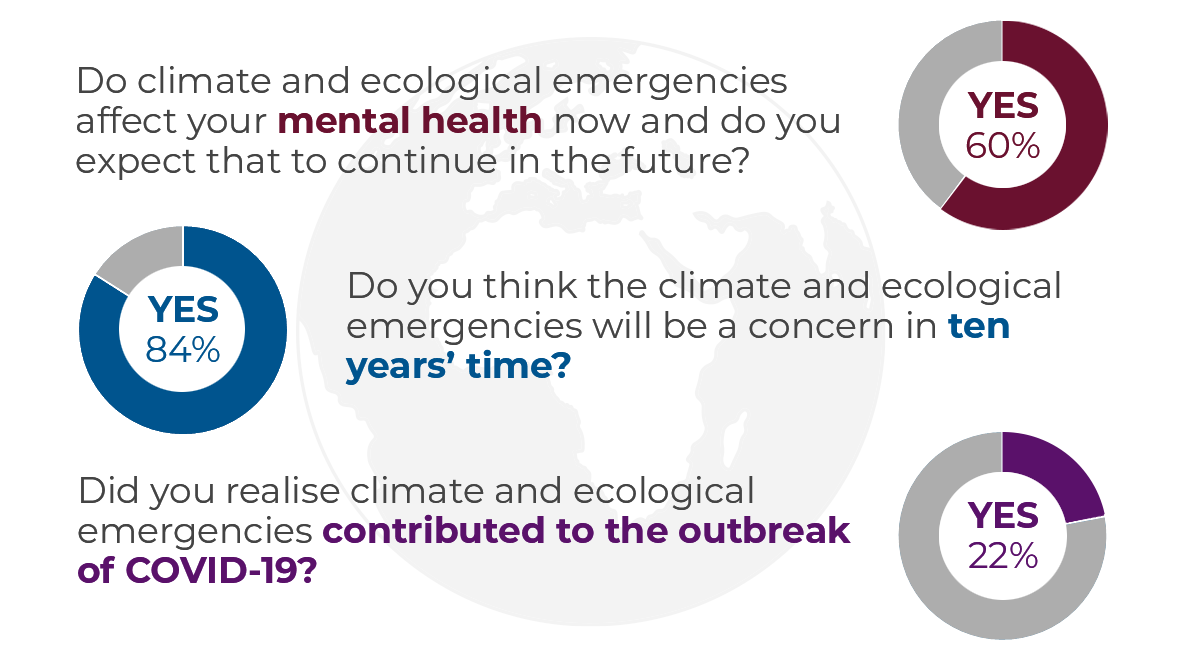
More than four-fifths (84%) of the UK public think the climate and ecological emergencies will affect mental health in a decade at least as much as unemployment (83%) and Covid 19 (84%), new research from the Royal College of Psychiatrists has found.
Three in five (60%) respondents say that the climate and ecological emergencies are affecting their mental health now and will continue to do so in the future.
Alarmingly, many appear unaware that the climate and ecological emergencies were a contributing factor to the global outbreak of COVID-19. Just one fifth (22%) think so, whereas two fifths (40%) do not, although a significant minority say ‘maybe’ (29%).
The Royal College of Psychiatrists is calling for international cooperation and urgent action by declaring a climate and ecological emergency.
The declaration is supported by a statement published today (6 May) with recommendations for psychiatrists, the NHS, research institutes and Government to tackle the crisis and promote more sustainable clinical practices.
Dr Adrian James, President of the Royal College of Psychiatrists said:
“The disruption to life posed by the climate and ecological emergencies presents an unprecedented threat to our health in the UK and worldwide.
“The climate and ecological emergency is a mental health emergency. Our mental health is entwined with the health of our natural world.
“We have no choice but to join the voices of those who are calling for urgent action and declare a climate and ecological emergency to avert a health and mental health catastrophe.”
Around the world, climate change and environmental degradation are resulting in major repercussions on human health, including on mental health, and an unprecedented loss of biodiversity.
Human populations are already experiencing the health effects of more severe storms, floods, air pollution, wildfires and droughts, whilst food insecurities, extinction events and loss of habitats are drastically changing people’s lives especially in the global South.
The ramifications of climate and ecological emergencies are increasingly noticeable in the UK as well. Flooding which is associated with anxiety, depression and PTSD in survivors is the most common disaster in the UK. Due to climate change floods are increasing in frequency and severity.
Between 28,000-36,000 deaths a year in the UK, are due to air pollution exposure, while research points to the link between childhood exposure and mental illness in adulthood.
Dr Lisa Page, Joint Associate Registrar for sustainability of the Royal College of Psychiatrists, said:
“The knock-on effects of climate change and biodiversity loss will be felt on people’s mental health, we already see difficulties during heat waves.
“Many patients with serious mental illness experience worse physical and mental health on hotter days, polluted air has been linked to excess deaths and flood events with PTSD.
“If action isn’t taken the physical and psychological consequences will manifest in poorer health outcomes in the UK and overseas.”
RCPsych Position Statement on sustainability
For further information, please contact:
- Email: press@rcpsych.ac.uk
- Twitter: @rcpsych
- Out-of-hours contact number: 07860 755896











